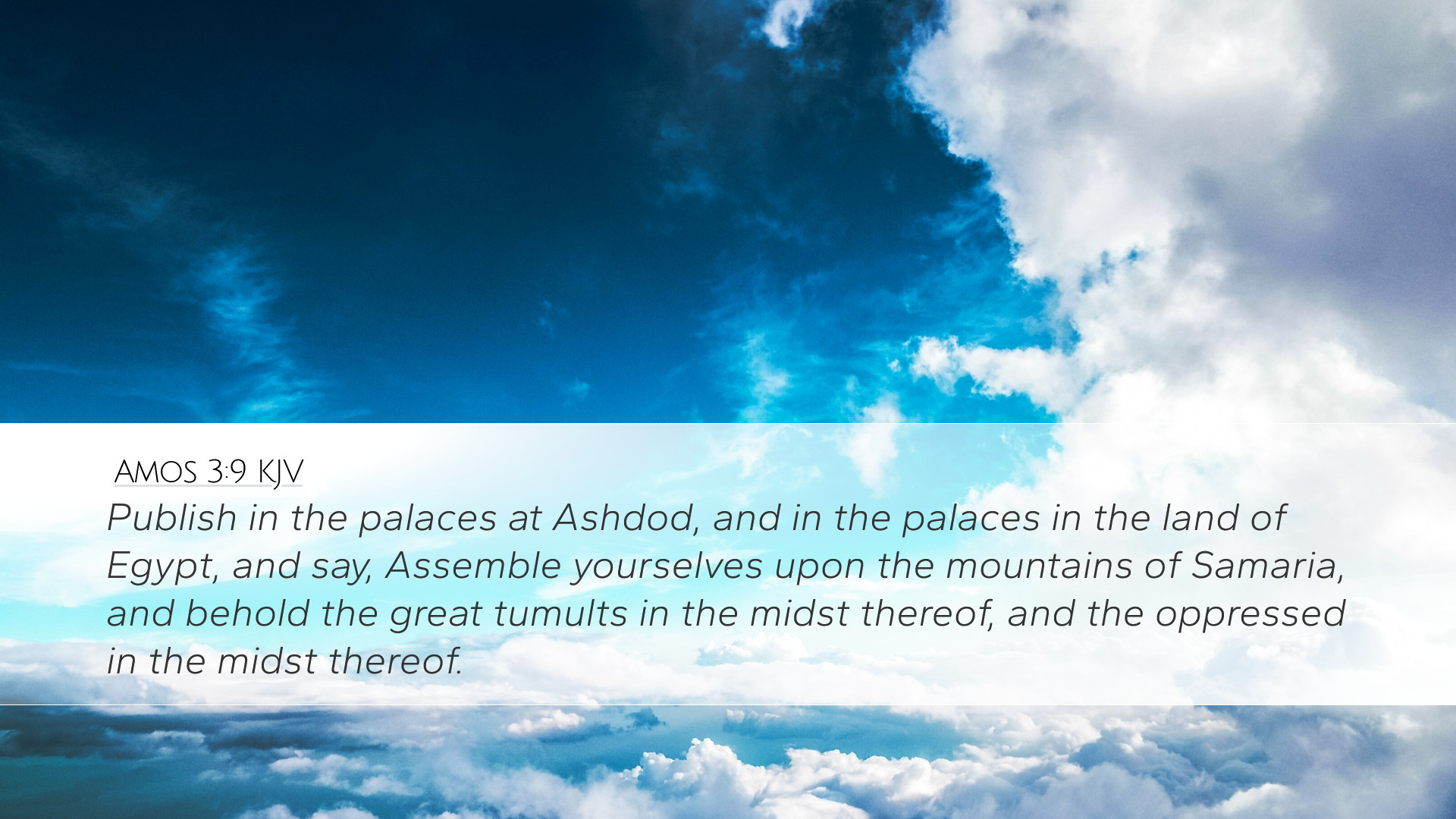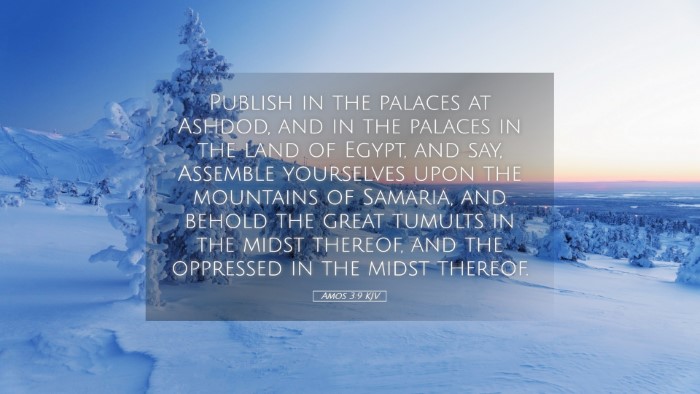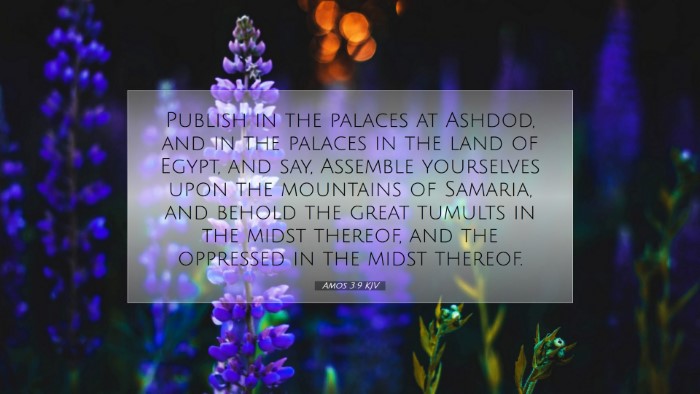Old Testament
Genesis Exodus Leviticus Numbers Deuteronomy Joshua Judges Ruth 1 Samuel 2 Samuel 1 Kings 2 Kings 1 Chronicles 2 Chronicles Ezra Nehemiah Esther Job Psalms Proverbs Ecclesiastes Song of Solomon Isaiah Jeremiah Lamentations Ezekiel Daniel Hosea Joel Amos Obadiah Jonah Micah Nahum Habakkuk Zephaniah Haggai Zechariah MalachiAmos 3:9
Amos 3:9 KJV
Publish in the palaces at Ashdod, and in the palaces in the land of Egypt, and say, Assemble yourselves upon the mountains of Samaria, and behold the great tumults in the midst thereof, and the oppressed in the midst thereof.
Amos 3:9 Bible Commentary
Commentary on Amos 3:9
Verse Text: "Publish in the palaces at Ashdod, and in the palaces in the land of Egypt, and say, Assemble yourselves upon the mountains of Samaria, and behold the great tumults in the midst thereof, and the oppressed in the midst thereof."
Introduction
The prophet Amos delivers a powerful message in Amos 3:9, calling for an assembly and a proclamation of the events in Samaria. This verse serves as a somber reminder of the moral and social decay that had overtaken Israel, illustrating God's desire for righteousness and justice.
Contextual Background
Amos was a shepherd from Tekoa who prophesied during the reign of King Jeroboam II in Israel, around 760-750 BC. His messages are a mixture of impending judgment and a call to repentance. The context of this verse reflects the prophet's role as a social reformer responding to the corruption and injustices prevalent in Israel.
Insights from Public Domain Commentaries
Matthew Henry's Commentary
Matthew Henry posits that this verse is a summons to nations around Israel to witness the moral decay and injustice occurring within its borders. By calling out to Ashdod and Egypt, two historically pagan nations, Henry emphasizes that the injustice in Israel is so pronounced that even those outside the covenant community should take notice. Henry writes, “The Lord will have His people, even the Gentiles, informed of the wretchedness and misery of His people, which should provoke them to penitential consideration.”
Furthermore, he highlights that God's judgment is not arbitrary but based on the clear, visible oppression and tumult within Israel. The 'mountains of Samaria' symbolize both a physical location and the elevated moral ground from which the people of Israel should be scrutinized. Insisting on assembling in such a prominent location implies the gravity of the situation, and the need to recognize the ‘great tumults’ that signify divine displeasure.
Albert Barnes' Notes
Albert Barnes comments on the invitation to the nations to “assemble themselves” and take note of the situation in Israel. He emphasizes that this verse reflects a call not only to judgment but also to a public acknowledgment of the conditions in Israel. Barnes states, “The very act of calling the nations to witness implies that their conditions are not hidden; they are visible and evident.”
Moreover, he elaborates on the phrase “the great tumults in the midst thereof,” indicating that the tumult represents both social and spiritual disorder - a direct result of turning away from God’s commandments. Barnes encourages readers to recognize the seriousness of this indictment and to understand that unfaithfulness leads to societal chaos. This commentary reframes the verse as not just an admonition but a call to discernment regarding one's own spiritual condition.
Adam Clarke's Commentary
Adam Clarke provides a linguistic and historical analysis of the verse, noting that the verb 'publish' suggests a bold proclamation of an urgent message. Clarke suggests that Amos's command to ‘publish’ extends beyond mere auditory communication; it signals a public rehearsal of Israel's sins and failures. This open declaration requires a strong stand against oppression and corruption: “The call is for a revelation of the iniquities which the people have allowed to fester among them.”
Clarke also draws attention to the targeted nature of the proclamation. By directing the message to Ashdod and Egypt, he underscores the notion of witness and accountability, calling those who are not even part of the covenant community to recognize the failings of Israel. This amplifies the urgency for repentance and the seriousness with which God regards justice and righteousness.
Theological Implications
The theological significance embedded in Amos 3:9 extends to modern audiences as a clarion call for accountability and justice. The prophet’s desire for nations to witness the social injustices and moral failures of Israel articulates a universal principle: that God’s people are called to uphold righteousness. The scrutiny from other nations serves as a biblical reminder that the behavior of believers impacts not only their personal relationship with God but also public perception of God's covenant community.
Application for Modern Believers
For pastors, students, theologians, and scholars today, Amos 3:9 encourages a posture of vigilance against injustices within the community. As we reflect upon the text, it urges us to examine not only our individual lives but also our collective society, prompting us to publicly denounce sin and advocate for the oppressed. The call to “publish” should ignite a passion for prophetic witness in the face of social injustices.
- Public Witness: Just as Amos called others to witness Israel’s injustices, believers today must engage in public discourse around moral and ethical issues.
- Social Justice: The message compels individuals to take action against inequities within their communities, championing the cause of the oppressed.
- Accountability: Understanding that our actions are monitored by God and seen by the world obligates us to live righteously and justly.
Conclusion
In summary, Amos 3:9 serves as a powerful reminder of the role of the prophet as a social commentator and an advocate for God’s justice. By drawing on the insights of Matthew Henry, Albert Barnes, and Adam Clarke, we discern a profound theological message that resonates today. It calls believers to confront injustice boldly, urging them to live lives marked by righteousness and to become voices for the voiceless in a world often plagued by iniquity.


